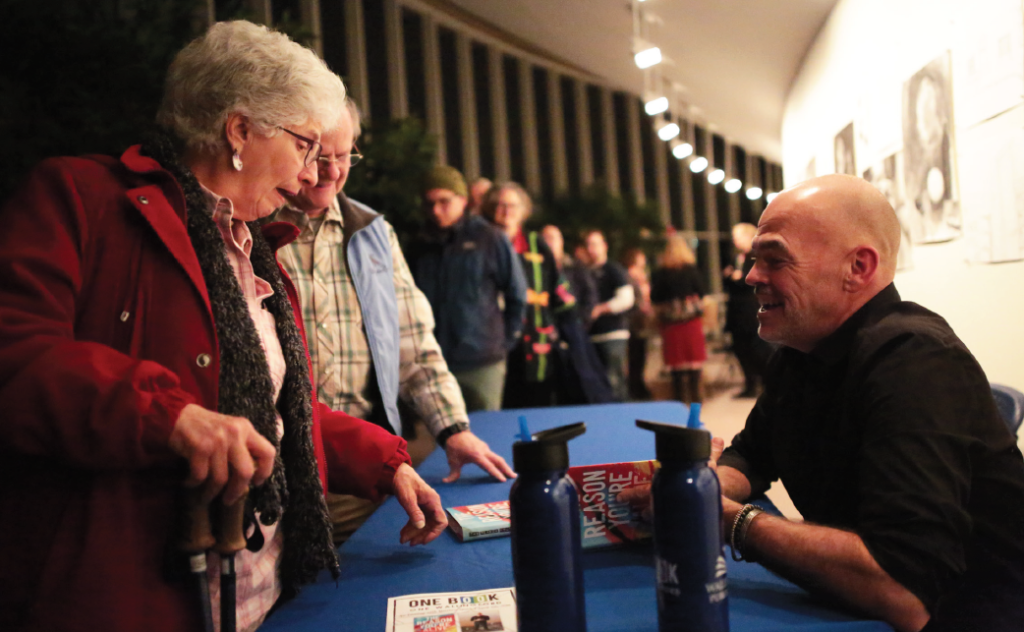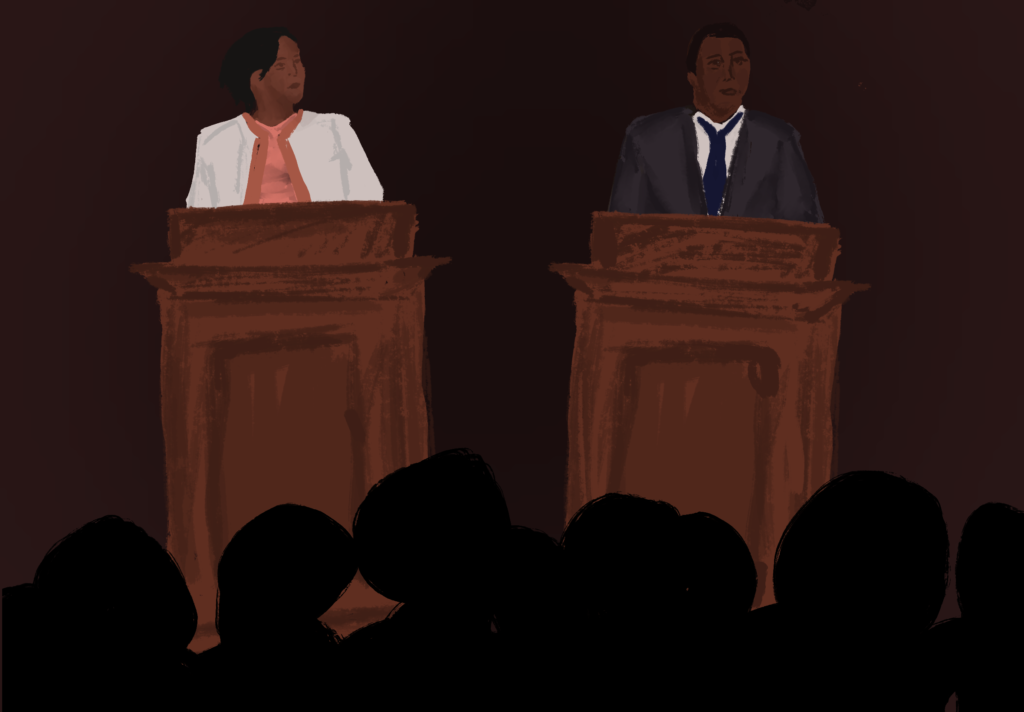On April 4, the Wallingford Public Library’s One Book, One Wallingford series culminated in a visit from the author of the selected novel, Mr. Matthew Quick. The event, the planning for which began over the summer, was held at Choate’s Paul Mellon Arts Center and was advertised as an opportunity to meet Mr. Quick and witness a discussion of his novel The Reason You’re Alive. However, the event was much more than a book discussion. Mr. Quick made the listeners feel privy to far more than the inspirations for his novel, delving into his reasons for writing.

Mr. Matthew Quick signed copies of his novel The Reason You’re Alive at the One Book, One Wallingford program.
The library invited the whole town to read and engage in discussion about The Reason You’re Alive, a work of fiction featuring Vietnam veteran David Granger. The book is described on the program pamphlet as “a compassionate story of a complex man trying to find his way in a divided America.” The library kicked off the One Book, One Wallingford program with a book revealing ceremony and launched into a string of book discussions, a Q&A with Vietnam veterans, a scientific examination of post-traumatic stress disorder, and several other related programming events held all across Wallingford. Mr. Quick’s discussion marked the end of the One Book, One Wallingford series of 2018, but members of the planning committee have expressed the program is likely to continue in successive years.
According to Ms. Courtney Jaser, Choate’s Instruction and Digital Services Librarian and a member of the One Book planning committee, the WPL sold over 200 tickets for the event. On Wednesday evening, many Wallingford residents — though disappointingly few Choate students — filed into seats in front of the PMAC main stage. Wallingford Public Library Director Ms. Jane Fisher opened the program by thanking all those who had helped out with the event, particularly Adult Programming and Community Services Librarian Ms. Julie Rio. “I told [Ms.] Julie [Rio] I’d present her with a tiara tonight, and she threatened to resign,” joked Ms. Fisher.
Mr. Quick’s aptitude for putting words together was reinforced throughout the whole of his discussion. He managed to keep his audience utterly engaged for over an hour with nothing but a microphone, sincerity, and a touch of humor. “I didn’t really know that much about what to expect about what he was going to talk about, but I was pleasantly surprised because he’s a really good story teller, and he was really engaging,” said Ms. Jaser. “I think that the way that he speaks and the way that he writes really just speaks to a lot of people in a lot of different ways.”
Mr. Quick explained the inspirations for The Reason You’re Alive through a series of interrelated anecdotes rather than referencing any specific portion of the text. He reminisced about his Uncle Pete, emphasizing that the novel was “inspired by” and not “based on” the relative. Regardless, Mr. Quick’s uncle and the fictional David Granger had a great deal in common: both were Vietnam veterans, both believed their brain tumors were the product of Agent Orange used in the war, and both were startlingly profane. Mr. Quick described how Uncle Pete tended to give inappropriate Christmas gifts. However, the author was quick to dispel any misinterpretations of his uncle, intermingling descriptions of the man’s lack of filter with those of more affectionate moments. He explained how Uncle Pete was one of very few to support his decision to become a writer and one of the first to read his books, regardless of their topic.
“On one hand, he used crass language, said offensive things, loved his guns and knives, and continued to dress in camouflage since returning from Vietnam,” said event attendee and Moses Y. Beach librarian Mrs. Anne Porier, recounting Mr. Quick’s description of his uncle. “On the other hand, he wrote [Mr.] Matthew [Quick] deeply empathetic letters addressing things like the loss of his dog and encouraging him to take care of his own mental health issues.” Mr. Quick illustrated the two-sidedness of prejudice, and commented on the complexities of human beings as multifaceted characters.
From Mr. Quick’s talk, audience members learned not only about The Reason You’re Alive, but about the hand that penned it. He often allowed them to make their own connections between the story he shared and what was written in the novel. Mr. Quick’s ability to not take himself too seriously made him tangible, even as he mentioned working with famous directors on film adaptations of his novels. He provided the audience with a self deprecating description of his adolescent person. When a phone went off in the audience, Mr. Quick made a facetious quip about how he used to confiscate phones during his tenure as a high school English teacher. On a serious note, Mr. Quick spoke about his battle with depression and anxiety and the lack of support he received when deciding to write.
“His candidness about his anxiety and depression really was striking to me because, as one of the audience members noted, most people don’t tend to talk about those things,” said Ms. Jaser. “It just makes him and his characters more relatable because a lot of people deal with issues like that and aren’t necessarily talking about them.”
A question and answer session followed, with many audience members probing Mr. Quick’s motivations for writing, as well as a book purchasing and signing that benefited the WPL. The author managed to awaken those present to the nature of prejudice, the universal importance of mental health issues, and the complexity of human beings all in a mere 60 minutes. “I think the book fulfilled its promise in challenging readers to question their own views of the world and of other people,” said Mrs. Porier. “After hearing the author speak I actually want to read it again with a new perspective.” Anyone interested in exploring Mr. Quick’s works can now find a signed copy of The Reason You’re Alive at Choate’s library.




